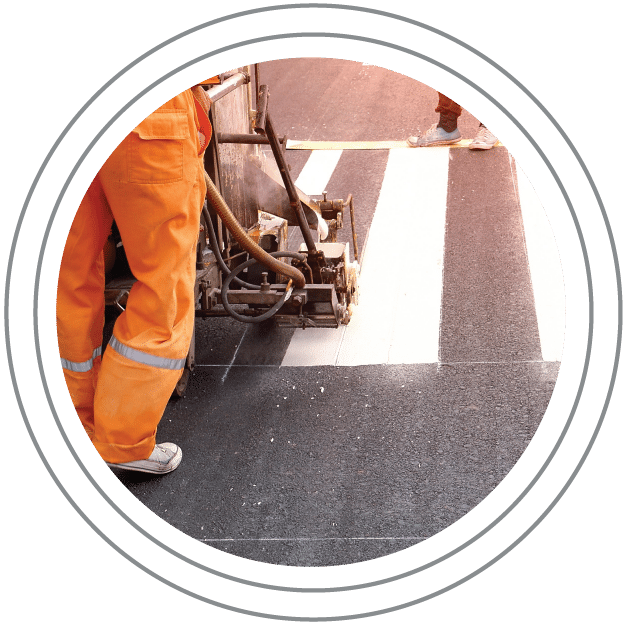Case Study
Driving Roadway Sustainability
BIOBASED ROSIN ESTERS™ FOR SAFER ROAD MARKINGS
Improving road safety is an ongoing priority for many governments and road owners. With population growth and mobility increasing, we have also seen increases in traffic accidents and deaths around the globe. Car manufacturers, road owners, road maintenance contractors, and road marking formulators are all working to ensure a safer and more sustainable road environment for road users.
Kraton is helping road marking formulators create safer road environments with SYLVACOTE™ 4995, a maleic-modified glycerol rosin ester designed as a binder resin for durable hot melt thermoplastic road marking formulations. This biobased rosin ester helps formulators deliver excellent nighttime visibility for drivers, longer service life for road owners, and improved predictability for road marking contractors.
In road markings, binder resins like SYLVACOTE 4995 help provide lasting visibility for motorists by enabling excellent adhesion to the road surface and the glass beads, which make road markings visible at night. A prominent transportation institute estimated that an average crash reduction of 21% can be attributed to better pavement markings. Highly visible, brighter road markings are essential to traffic safety, helping deter nighttime run-off-the road and opposite-direction accidents. More recently, as driver assistance technology based on machine vision has advanced, the importance of pavement markings in reducing crashes has increased even more. Driver assistance technology and autonomous vehicles can potentially eliminate 50% of fatal accidents caused by roadway departures.
While enhancing road safety remains critical for road and highway sustainability, the industry has recently sought to increase sustainability practices across the entire value chain. Developed from Kraton’s pine-based raw materials, SYLVACOTE 4995 is a high-performance rosin ester having over 90% biobased content. As a result, we can offer formulators and customers a reduced carbon footprint compared to petroleum-based resin alternatives. The USDA BioPreferred® Certification Scheme, which validates biomass content, is currently in progress for the product.
SYLVACOTE 4995 also provides ease of use for contractors applying the road marking formulation due to its enhanced thermal stability. Because its melt viscosity and color remain consistent when melting and applying the formulated road marking, even if unexpected extreme weather conditions occur, the applied product stays in specification from beginning to end of the striping job. In addition, SYLVACOTE 4995 offers excellent batch-to-batch consistency and broader compatibility with other road marking ingredients, thus ensuring a highly robust product and reliable job execution for road marking contractors. Thermoplastic road markings using these biobased resins can offer long-lasting performance, lasting five to ten years, depending on traffic conditions.
From improving nighttime driving to enabling high-quality car automation, road markings will continue to play a vital role in advancing driver and roadway safety. As the discussion around transportation sustainability increases, Kraton is committed to delivering products and solutions that address the concerns of the road safety industry.
FEATURED

Paving

Road Markings

Automotive

